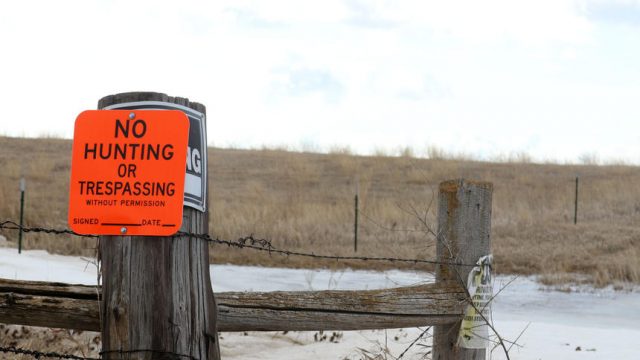If Hunting Groups Keep Winning Political Battles Over Posting Land They Could Lose the War

As it was originally introduced, SB2315 would have ended the presumption of open access to rural land for activities like hunting. Under current law, if property owners like farmers and ranchers don’t want want the public on their land they have to post it as closed. The intent of SB2315 was to turn that requirement around and make it so land was closed unless posted as open by property owners.
The original bill also included the creation of a state database to facilitate land owners communicating the status of their property.
The bill was amended, though. “Senate Bill 2315, as passed by the Senate, would have set up a database for landowners to choose whether to mark their land open or closed to hunters. Landowners could still have chosen to physically post their land,” my colleague Jenny Schlecht reported yesterday.
[mks_pullquote align=”right” width=”300″ size=”24″ bg_color=”#ffffff” txt_color=”#000000″]In the short term the hunters are winning this fight. But if they win enough of these political battles, they may lose the war.[/mks_pullquote]
Her report was occasioned by the House chamber changing the bill even further. “The bill that passed the House would make few changes to existing law,” she wrote. “It would allow landowners to ask people to leave their land, even if the landowner had chosen not to post it for no trespassing, would prevent people from going on private land for reasons other than hunting and would prohibit people from guiding or outfitting on private land without permission. It also would make entering posted private land without permission a noncriminal offense for a first incident and a Class A misdemeanor for subsequent incidents.”
While this iteration of the bill strengthens our state’s too-lax trespass laws to some degree, it doesn’t address the fundamental problem the property owner side of this debate has, which is that there’s a presumption of access to their land which costs them time and money to block if they don’t want random members of the public traipsing across it.
The bill passed by the House will now go to conference committee, since it’s very different from what the Senate passed. I suspect the two chambers will ultimately agree to pass something. That something is unlikely, at this point, to bring much in the way of resolution.
This debate is a consequential one for the whole state. The property owners, for the most part, are the farmers and ranchers who make up our state’s most important industry. The hunters and other outdoors enthusiasts, however, are central to our state’s tourism industry which, in turn, has been central to long-term efforts to diversify our economy.
If state law makes access to land for things like hunting harder, it could hurt tourism in a major way.
It could also bring about a major cultural shift in our state away from its hunting and outdoors traditions.
So far the hunting/outdoors interests seem to be winning this debate in the Legislature. They’ve flooded lawmakers with messages against this legislation, and lawmakers have responded it by watering this bill down at every turn.
That was always going to be a political obstacle for the land owners. The hunters and other outdoors enthusiasts, who mostly live in the state’s urban areas and even out-of-state, simply outnumber them.
But the land owners have a trump card.
It’s their land.
If the land owners aren’t appeased, more and more of them may well decide they’ve had it with the hunters and the hikers and the snowmobilers, and simply start closing off their land. Which they have every right to do.
If the outdoors enthusiasts don’t make concessions, they may well lose everything.
In the short term the hunters are winning this fight. But if they win enough of these political battles, they may lose the war.
UPDATE: Originally this post referred to John Hageman as the author of the report about the House’s actions this week. It was actually reporter Jenny Schlect. I’ve corrected the post to reflect this.




